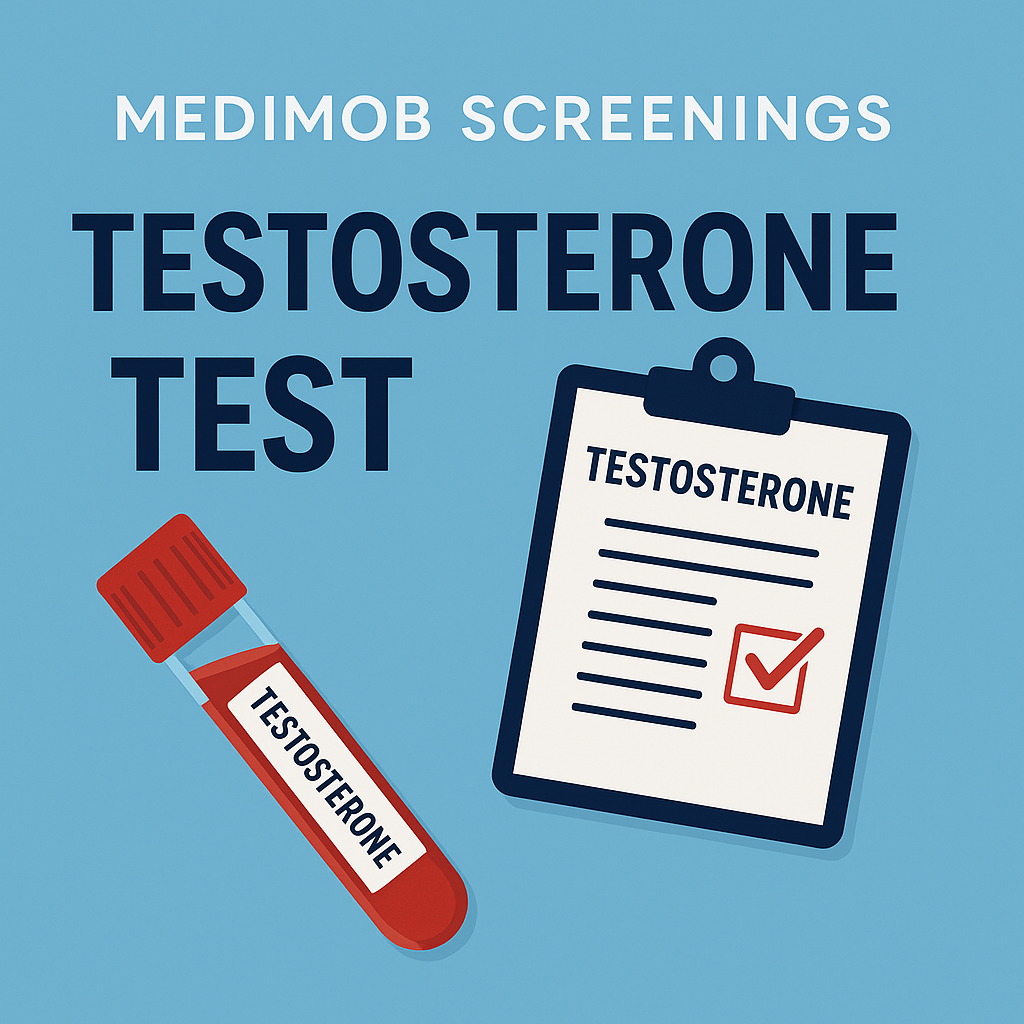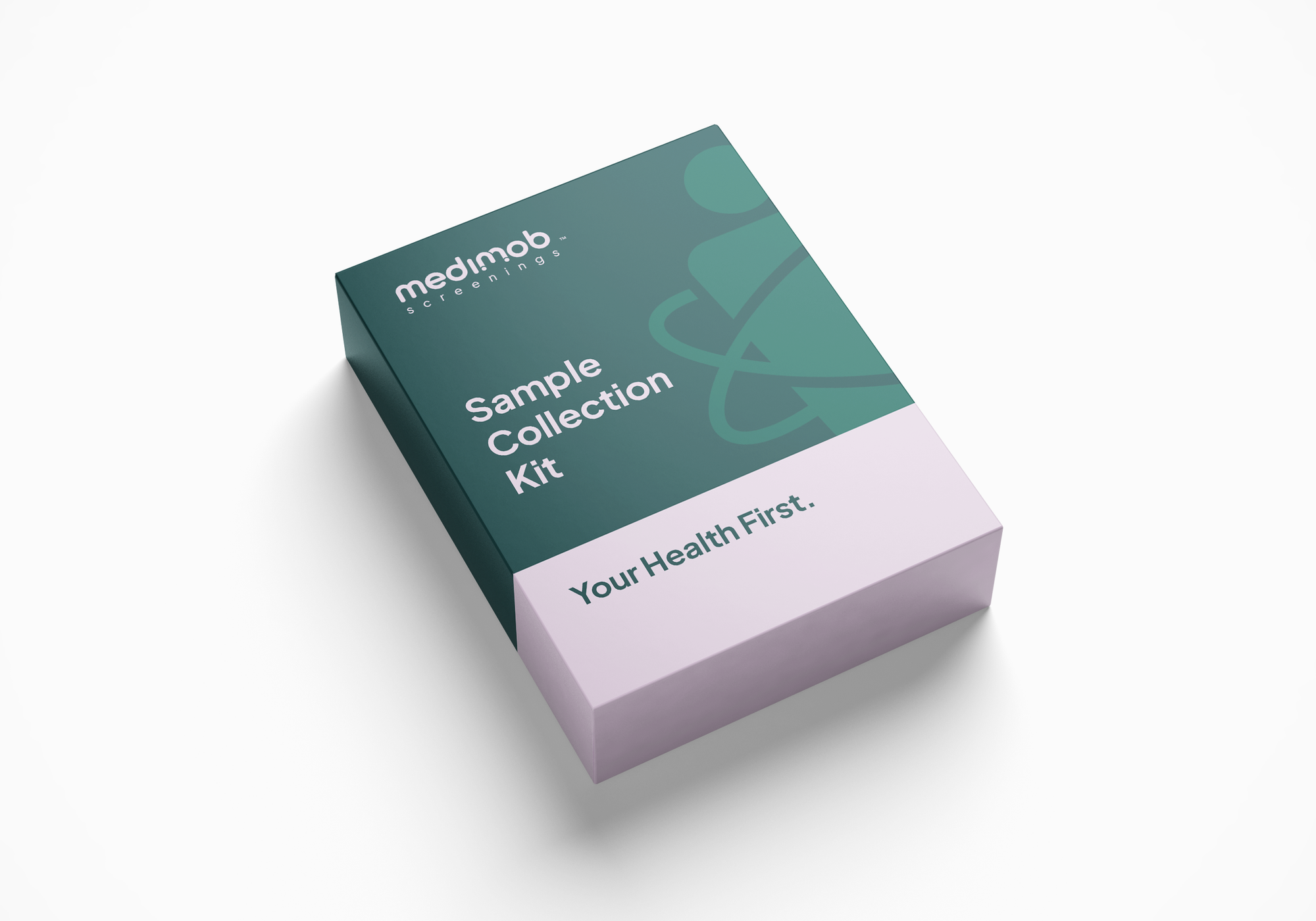Testosterone Test
A testosterone blood test checks hormone levels to diagnose issues like low libido, infertility, or irregular periods. Learn what it means, how to prepare, and what your results show.

Overview: What is a Testosterone Test?
A testosterone test is a simple blood test used to measure the levels of testosterone—a vital hormone—in your bloodstream. Testosterone plays a key role in many body processes including muscle growth, bone density, sexual development, and mood regulation.
While testosterone is commonly thought of as a "male hormone," it’s also present in women, just in lower amounts. Abnormal testosterone levels in either direction—too low or too high—can indicate underlying health issues for all genders.
Why You Might Need a Testosterone Test
Your doctor may recommend a testosterone test if you're experiencing symptoms that suggest a hormone imbalance.
Common reasons men are tested:
- Low sex drive (libido)
- Erectile dysfunction (ED)
- Infertility
- Low energy or fatigue
- Loss of body hair
- Decreased muscle mass
- Gynecomastia (enlarged breast tissue)
Common reasons women are tested:
- Irregular menstrual cycles
- Excess facial or body hair (hirsutism)
- Acne or oily skin
- Deepening of the voice
- Hair thinning on the scalp
- Polycystic ovary syndrome (PCOS)
Children and adolescents:
Testosterone levels may also be tested in children with early or delayed puberty to evaluate their development.
Types of Testosterone Tests
There are different types of testosterone that may be measured:
- Total testosterone: Measures both free and bound testosterone in your blood.
- Free testosterone: Measures only the unbound testosterone, which is the active form your body can use.
- Bioavailable testosterone: Sometimes tested to get a clearer picture, particularly in complex cases.
Preparing for the Test
Here’s how to prepare for a testosterone blood test:
- Timing: Testosterone levels are highest in the early morning, so tests are usually done between 7 a.m. and 10 a.m.
- Fasting: Your doctor might ask you to fast before the test, especially if you’re getting other blood tests at the same time.
- Medications: Tell your doctor about any medications or supplements you're taking, as they could affect your hormone levels.
Full Testosterone Check (5 Biomarkers) From the Comfort Of Your Home
What to Expect During the Test
The procedure is quick and straightforward:
- A phlebotomist (trained professional) will clean your arm, usually near the elbow.
- A small needle will be inserted into a vein to draw blood.
- You might feel a slight pinch.
- The sample is collected in a tube and sent to a lab.
- You’ll receive your results in a few days.
The whole process usually takes less than 5 minutes.
Are There Any Risks?
The testosterone test is very safe. Minor risks include:
- Slight pain or bruising at the needle site
- Light-headedness (rare)
These symptoms usually go away quickly.
Interpreting Your Testosterone Test Results
Testosterone levels vary based on your age, gender, time of day, and even the lab processing your test.
Here are general reference ranges:
| Group | Normal Total Testosterone (ng/dL) |
|---|---|
| Men | 300–1000 ng/dL |
| Women | 15–70 ng/dL |
| Children | Varies by age and development |
⚠️ Always interpret results with your doctor. "Normal" values can differ between labs and individuals.
What Does a Low Testosterone Level Mean?
In men, low levels may indicate:
- Primary hypogonadism: The testes aren't producing enough testosterone.
- Secondary hypogonadism: The pituitary gland or hypothalamus isn't signaling the testes correctly.
- Chronic conditions like type 2 diabetes, obesity, or liver disease.
In women, low testosterone may be caused by:
- Adrenal insufficiency (Addison’s disease)
- Ovarian insufficiency or menopause
- Nutritional deficiencies
What Does a High Testosterone Level Mean?
In men:
- Testicular or adrenal tumors
- Overuse of testosterone supplements or anabolic steroids
In women:
- Polycystic Ovary Syndrome (PCOS)
- Congenital adrenal hyperplasia
- Ovarian or adrenal tumors
- Certain medications like corticosteroids or anti-seizure drugs
What Biomarkers Are Commonly Tested Alongside Testosterone?
To get a full picture of your hormonal health, your doctor may order additional tests, such as:
- LH (Luteinizing Hormone) – to check pituitary function
- FSH (Follicle-Stimulating Hormone) – often tested with LH
- Estradiol – especially in women or transgender individuals
- DHEA-S – to assess adrenal function
- Prolactin – high levels can lower testosterone
- SHBG (Sex Hormone Binding Globulin) – affects the amount of free testosterone
Check these hormones with the male hormone test (9 biomarkers).
Can You Take a Testosterone Test at Home?
Yes, at-home kits are available, but accuracy can vary. Most at-home tests use saliva, which is less reliable than blood samples.
For the most accurate and reliable results, blood tests ordered and interpreted by a healthcare provider are the gold standard.
Full Testosterone Check (5 Biomarkers) From the Comfort Of Your Home
What Happens After the Test?
- Normal results: No action may be needed unless symptoms persist.
- Abnormal results: Your provider may recommend further testing or treatment.
- Treatment options depend on whether your levels are too high or too low and what’s causing the imbalance.
Treatment for Testosterone Imbalance
Low Testosterone (in men):
- Testosterone Replacement Therapy (TRT) – via gels, injections, patches, or pellets
- Lifestyle changes: weight loss, improved sleep, stress reduction
- Treating underlying conditions (like diabetes or pituitary disorders)
High Testosterone (in women):
- Oral contraceptives to balance hormones
- Spironolactone – a medication that reduces androgens
- Managing PCOS through diet, exercise, and medications
When to Speak to a Doctor
You should speak to a healthcare provider if you notice:
- Persistent fatigue or low energy
- Loss of sexual desire
- Irregular periods or excessive hair growth in women
- Mood changes or depression
- Issues with fertility
Never try to self-treat hormonal issues with over-the-counter supplements without medical advice.
Famous Cases of Testosterone Issues
While privacy laws limit what we know about individuals' hormone health, some public figures have discussed testosterone therapy:
- Sylvester Stallone has openly discussed using testosterone therapy under medical supervision to combat aging symptoms.
- Athletes in professional sports have faced controversies involving testosterone and performance-enhancing drugs.
These examples underscore the importance of using testosterone only under proper medical guidance.
FAQs About Testosterone Tests
1. Can I boost testosterone naturally?
Yes. Exercise, sleep, stress management, and weight loss can help raise testosterone naturally.
2. Can women benefit from testosterone therapy?
In specific cases like low libido or menopausal symptoms, low-dose testosterone therapy might be prescribed—but always under medical supervision.
3. Does insurance cover testosterone testing?
In many cases, yes—especially if your doctor orders the test due to symptoms or a related medical condition.
References & Trusted Sources
Conclusion
A testosterone test is a powerful tool to uncover hidden health issues, from hormonal imbalances to reproductive health. Whether you're experiencing unexplained fatigue or dealing with fertility concerns, understanding your hormone levels is a key step toward optimal well-being.
If you're unsure whether a testosterone test is right for you, talk to a qualified healthcare provider who can guide you with accurate information and evidence-based care.
Full Testosterone Check (5 Biomarkers) From the Comfort Of Your Home




